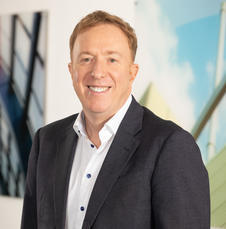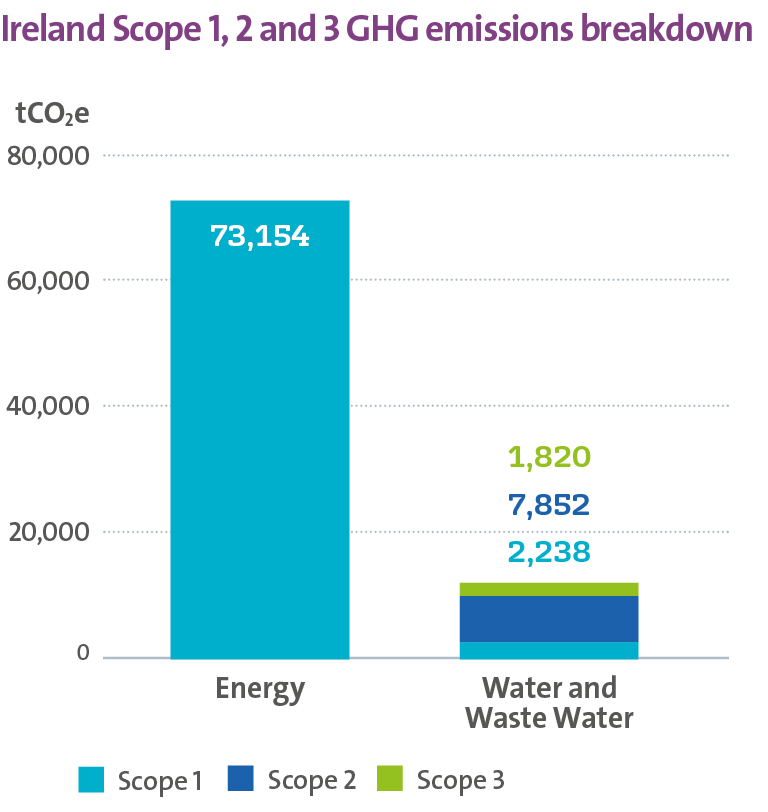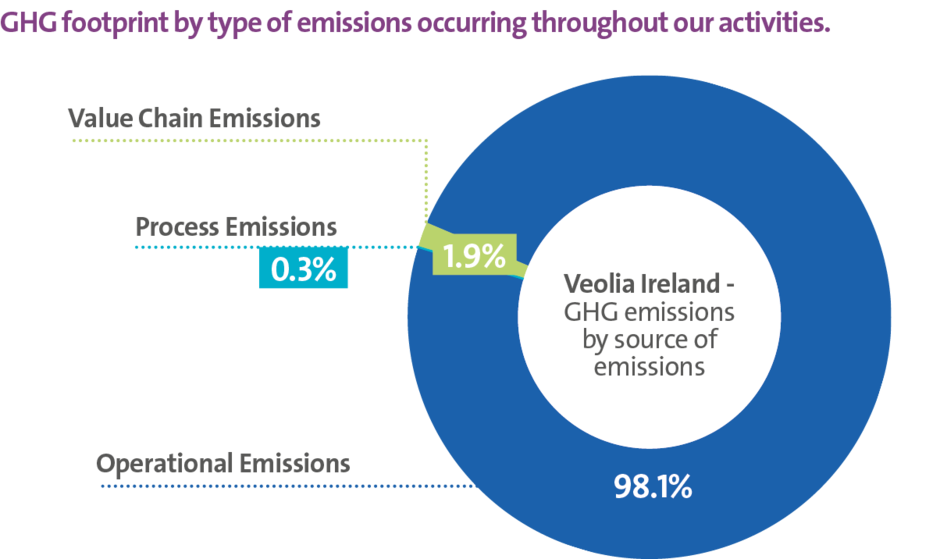Veolia in the UK and Ireland, through our ambition to enable ecological transformation, has a high-level of responsibility providing waste, water, and energy management services that are essential to everyday life. We take this responsibility seriously, recycling over 2 million tonnes of waste each year, generating more than 1,210GWh of renewable electricity per year and serving 1.8 million people through our municipal wastewater contracts that treat 800 million cubic meters of wastewater every day.

These services are indispensable to both the economy and society, yet we recognise the need to further reduce emissions across all sectors. This is why we are taking immediate action to drive Net Zero across our activities.
Collaborating and working across industries is at the heart of our plan to achieve Net Zero. As an industry leader, we are committed to driving new processes, business models and market opportunities to decarbonise our waste, water and energy sectors.
At Veolia, we stand in a very unique position with activities spanning the waste, water and energy sectors with opportunities for multifaceted solutions. We do not see our sector operations as separate entities, but rather as complementary activities that are mutually reinforcing to drive forward Net Zero together.
Gavin Graveson
Executive Vice President, Veolia UK and Ireland
30th September 2021
Download our full road map
Our progress so far
Resourcing the world is what we do on a daily basis through our waste, water and energy activities.
Veolia’s decarbonisation journey in Ireland started over 30 years ago. Since 2009 our UK and Ireland activities have contributed to avoiding more than 12.6 MtCO2e by recycling and recovering waste we receive, treating water and wastewater and ensuring low carbon heat, electricity and industrial utilities for our clients.
Veolia Ireland is working with its customers so they can lead the way in improving their environmental performance.
Reducing CO2 emissions
eBay Ireland was the first in its global organisation to achieve ISO 50001 certification for energy management, thanks to the services of Veolia helping it to reduce annual electricity use by 20%, gas by 35% and water by 10%. Furthermore, UPMC Whitfield was the first hospital in the UK and Ireland to achieve the same certification.
The first private and public healthcare sector Energy Performance Contracts were put in place between Veolia Ireland and Stewarts Care (a voluntary hospital - winner of Best Energy Service Project in the Public Sector by European Energy Service Initiative), UPMC Whitfield and UPMC Aut Even (winner at SEAI Sustainable Energy Awards), Mater Misericordiae Hospital (1st public hospital EPC - reducing carbon footprint by 81,000 tonnes) and St James Hospital (largest public hospital EPC - reducing carbon footprint by 118,380 tonnes).
We also work with Marino Institute of Education and helped them to form a Better Energy Community to bring long-term energy savings on campus, reducing carbon emissions by 25%
Increasing recycling and recovery rates
Veolia Ireland has helped multiple pharmaceutical and high-tech customers to eliminate waste to landfill, and significantly increase their recycling and recovery rates, also introducing circular solutions.
Over the last five years one pharmaceutical customer has seen:
-
its largest waste volume stay in Ireland and recovered for use as an alternative fuel in the cement industry
-
its waste to landfill eliminated
-
90 non-hazardous waste streams identified and segregated for recycling, and
-
its carbon footprint further reduced thanks to transport adjustments.
Renewable energy for water and sludge treatment
Veolia Ireland is currently finalising commissioning on Ireland’s first energy-self-sufficient sludge treatment plant for our customer Irish Water at Osberstown in Co. Kildare, which utilises advanced anaerobic digestion in combination with patented Veolia technologies. This is reducing the plant’s CO2 emissions by 8,500 tonnes per annum.
Veolia Ireland has also helped Polecat Springs Group Water Scheme to become the first Group Water Scheme to use renewable solar energy to directly power its water treatment plant.
A responsible business
Veolia Ireland is accredited to the Business Working Responsibly Mark, based on ISO 26000, since 2016 and renewed in 2019, one of only 40 companies to hold this accreditation.
We are a member of the Leaders Group on Sustainability of Business in the Community Ireland, being on the committee of the Low Carbon subgroup which developed the Low Carbon Pledge and contribute to various thought leadership sessions on the Circular Economy.
Our GHG footprint
Understanding our GHG footprint and developing our 2020 baseline
To demonstrate our starting position to drive Net Zero across Veolia UK and Ireland, we have reviewed our carbon footprint and set 2020 as a baseline year for the GHG footprint of Veolia UK and Veolia Ireland.


Emissions from our processes and operations are reported under Scope 1 and Scope 2 emissions, accounting for 96% of our GHG emissions. In contrast, just under 4%, comes from activities in our value chain, reported under Scope 3. This is why our Net Zero Roadmap is focusing primarily on the Scope 1 and 2 emissions.
Our commitments and roadmap
We have prioritised delivering low carbon services for our customers, which involves recycling and recovering waste, energy efficiency and water services. However, we need to go further and decrease the carbon intensity of these essential services that we provide.
Following external and internal consultation, we have developed an ambitious and achievable carbon reduction plan to drive us towards our 2050 Net Zero ambitions. These are underpinned by the following six key commitments
#1: Reducing our operational emissions
In Ireland, we will focus in the short term on our sites and offices’ carbon footprint and, where practical, that of our water operations infrastructure.
We will also target a 2% year-on-year reduction in our energy consumption, relying on a fully decarbonised grid by 2045, and ensuring all new company cars or vans will be fully electric or hybrid from 2026, with our fleet fully decarbonised by 2040.
With regard to our sites and offices’ footprint, this includes a project to install solar photovoltaics at our waste transfer facility in Fermoy, Co. Cork, as well as at our largest water treatment sites. In the longer term we will look to develop a rollout strategy for solar PV for long duration operational contracts, thereby improving the energy efficiency of these sites.
We will also look to increase the Scope for our ISO 50001 Energy Management certification to incorporate our offices and reflect the full Scope of our Irish operations. This, including the installation of sub metering in our leased offices, will ensure a sustainable ongoing management system to reduce and maintain at a minimum our support functions’ operational carbon footprint.
Our next step in evaluating our downstream transportation emissions is to combine the above long-term commitment to a decarbonised fleet with efficiencies analyses in our transportation routes and networks to identify, where practicable, alternative lower-overall-carbon solutions.
#2: Reduce our process emissions
As for the whole UK & Ireland zone, reducing process emissions from our activities is one of the biggest challenges in our journey to Net Zero. In addition to reviewing our models and calculations for our GHG process emissions and applying the learnings from the wider water and wastewater treatment industry, we will be taking some specific action locally.
We will look to build on the work done at the Osberstown Sludge Treatment Facility with advanced anaerobic digestion and thermal hydrolysis to utilise similar technologies where appropriate, as well as investigating alternative fuel sources, such as biodiesel.
While we have operational control at many of the sites which would be potentially suitable for projects like this, they are often owned by our customers and so will require us to work in partnership with them or at the very least ensure that any technologies we install are also compatible with our customers’ strategy for a particular site.
#3: Capture our remaining GHG emissions
For now, our focus in Ireland remains on reducing as much as possible our emissions through efficiency, investment and working in partnership with our stakeholders.
However, like throughout Veolia UK and Ireland, we recognise that capturing what remains will be necessary. We will be working with our colleagues throughout Veolia to explore our options, develop and implement the best strategy.
#4: Work in partnership to reduce the emissions we do not control
Similar to the UK, we are committed to work in partnership with our various stakeholders throughout Ireland.
We were delighted to be a member of the Business in the Community Ireland Leaders Subgroup for Low Carbon which this year relaunched the Low Carbon Pledge with new commitments, and to be one of the first 65 companies in Ireland to make this renewed commitment to leadership in action towards low carbon.
We also intend to continue to work with partner customers such as Irish Water to co-develop alternative sludge processing strategies and with our CHP customers to put long-term strategies in place. With a longer-term perspective, we will be promoting electrification in anticipation of the grid being fully decarbonised by 2045 at the latest.
#5: Improve the quality of our carbon reporting
Building on the work to date to improve our GHG reporting, the continuous improvement of our reporting is an ongoing focus in Ireland. This will be especially relevant as everyone’s understanding of and ability to map their carbon footprint evolves, particularly within Scope 3.
Our initial focus will be to include in the 2021 footprint the Refrigerant Gases and Downstream Transportation elements which we were unable to include in the 2020 footprint calculations.
#6: Continue to develop low carbon solutions for our customers
We have already implemented the first Carbon and Energy Fund (CEF) Energy Performance Contracts for public hospitals in Ireland, as well as successful efficiency projects and contracts across waste, water and energy for our various customers particularly in the Life Sciences, Food & Beverage, Technology and Public (water treatment, healthcare and education) sectors.
We will continue to increase our involvement and co-development work with our customers in this space. A number of additional conversations have already commenced with our clients to start work on low carbon roadmaps, in addition to the various projects already in operation, and we will continue to increase this focus for our stakeholders in the coming years. How we approach new business opportunities in the most sustainable way will also be part of our scope of study and ongoing strategy evolution
Veolia UK & Ireland Governance and Reporting
Governance
Veolia is committed to making changes that last. This is why carbon has a special part in our budget, allowing us to make environmentally sound key decisions. Our Executive Committee is meeting regularly to discuss our progress to reduce our GHG emissions and review investment decisions which will allow us to reach our targets. At the operational level, emphasis is placed on climate change awareness in order to allow all of our employees to make the right decisions.
Progress Review
We want to be transparent and open about our progress to drive forward our Net Zero ambitions. Our Net Zero Strategy and Carbon Reduction Plans will therefore be reviewed and updated annually. This will reflect any changes in organisational structure, allow us to refine data capture processes, quantify what we have achieved so far, and reassess our short, medium and long-term outlook.
Beyond this we will also hold a full-scale review of our Net Zero Strategy and Carbon Reduction Plans every 5 years.
Finally, a re-baselining and review of the Net Zero Strategy will also happen in the event of a material change to our baseline. This corresponds to a 5% variation, positive or negative, from previously calculated data.


